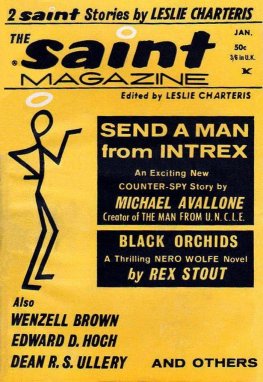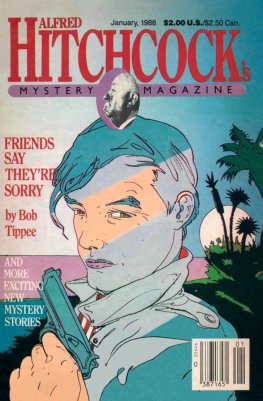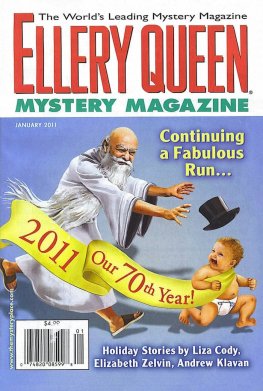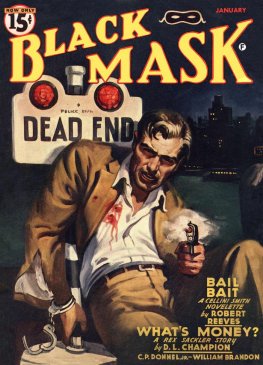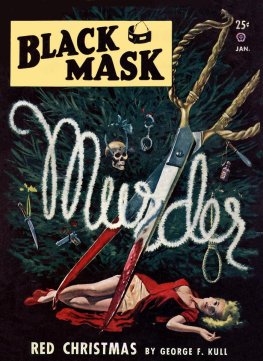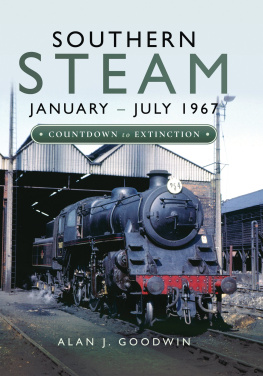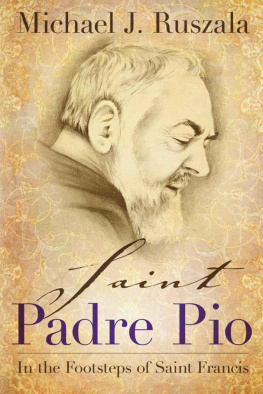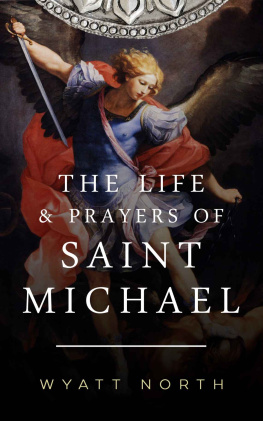Michael Avallone - The Saint Magazine. January 1967. Volume 24, No. 5.
Here you can read online Michael Avallone - The Saint Magazine. January 1967. Volume 24, No. 5. full text of the book (entire story) in english for free. Download pdf and epub, get meaning, cover and reviews about this ebook. City: New York, year: 1967, publisher: Fiction Publishing Company, genre: Detective and thriller. Description of the work, (preface) as well as reviews are available. Best literature library LitArk.com created for fans of good reading and offers a wide selection of genres:
Romance novel
Science fiction
Adventure
Detective
Science
History
Home and family
Prose
Art
Politics
Computer
Non-fiction
Religion
Business
Children
Humor
Choose a favorite category and find really read worthwhile books. Enjoy immersion in the world of imagination, feel the emotions of the characters or learn something new for yourself, make an fascinating discovery.
- Book:The Saint Magazine. January 1967. Volume 24, No. 5.
- Author:
- Publisher:Fiction Publishing Company
- Genre:
- Year:1967
- City:New York
- Rating:4 / 5
- Favourites:Add to favourites
- Your mark:
- 80
- 1
- 2
- 3
- 4
- 5
The Saint Magazine. January 1967. Volume 24, No. 5.: summary, description and annotation
We offer to read an annotation, description, summary or preface (depends on what the author of the book "The Saint Magazine. January 1967. Volume 24, No. 5." wrote himself). If you haven't found the necessary information about the book — write in the comments, we will try to find it.
The Saint Magazine. January 1967. Volume 24, No. 5. — read online for free the complete book (whole text) full work
Below is the text of the book, divided by pages. System saving the place of the last page read, allows you to conveniently read the book "The Saint Magazine. January 1967. Volume 24, No. 5." online for free, without having to search again every time where you left off. Put a bookmark, and you can go to the page where you finished reading at any time.
Font size:
Interval:
Bookmark:
The Saint Magazine. January 1967. Volume 24, No. 5.

The Export Trade
by Leslie Charteris
Copyright 1933 by Leslie Charteris
Veteran readers of the Saint Saga are used to having characters reappear in different stories. This month we are trying the interesting experiment of reprinting two such stories in the same issue, because they really seem to belong together.
L.C.
It is a notable fact, which might be made the subject of a profound philosophical discourse by anyone with time to spare for these recreations, that the characteristics which go to make a successful buccaneer are almost the same as those required by the detective whose job it is to catch him.
That he must be a man of infinite wit and resource goes without saying; but there are other and more uncommon essentials. He must have an unlimited memory not only for faces and names, but also for every odd and out-of-the-way fact that comes to his knowledge. Out of a molehill of coincidence he must be able to build up a mountain of inductive speculation that would make Sherlock Holmes feel dizzy. He must be a man of infinite human sympathy, with an unstinted gift for forming weird and wonderful friendships. He must, in fact, be equally like the talented historian whose job it is to chronicle his exploits with the outstanding difference that instead of being free to ponder the problems which arise in the course of his vocation for sixty hours, his decisions will probably have to be formed in sixty seconds.
Simon Templar fulfilled at least one of these qualifications to the nth degree. He had queer friends dotted about in every outlandish comer of the globe, and if many of them lived in unromantic-sounding parts of London, it was not his fault. Strangely enough, there were not many of them who knew that the debonair young man with the lean, tanned face and gay blue eyes who drifted in and out of their lives at irregular intervals was the notorious law-breaker known to everyone as the Saint. Certainly old Charlie Milton did not know.
The Saint, being in the region of the Tottenham Court Road one afternoon with half an hour to dispose of, dropped into Charlies attic work-room and listened to a new angle of the industrial depression.
Theres not much doing in my line these days, said Charlie, wiping his steel-rimmed spectacles. When nobodys going in for real expensive jewellery, it stands to reason they dont need any dummies. Look at this thing the first big bit of work Ive had for weeks.
He produced a glittering rope of diamonds, set in a cunning chain of antique silver and ending in a wonderfully elaborate heart-shaped pendant. The sight of it should have made any honest buccaneers mouth water, but it so happened that Simon Templar knew better. For that was the secret of Charlie Miltons employment.
Up there, in his dingy little shop, he laboured with marvellously delicate craftsmanship over the imitations which had made his name known to every jeweller in London. Sometimes there were a hundred thousand pounds worth of precious stones littered over his bench, and he worked under the watchful eye of a detective detailed to guard them. Whenever a piece of jewellery was considered too valuable to be displayed by its owner on ordinary occasions, it was sent to Charlie Milton for him to make one of his amazingly exact facsimiles; and there was many a wealthy dowager who brazenly paraded Charlies handiwork at minor social functions, while the priceless originals were safely stored in a safe deposit.
The Kellman necklace, Charlie explained, tossing it carelessly back into a drawer. Lord Palfrey ordered it from me a month ago, and I was just finishing it when he went bankrupt. I had twenty-five pounds advance when I took it on, and I expect thats all I shall see for my trouble. The necklace is being sold with the rest of his things, and how do I know whether the people who buy it will want my copy?
It was not an unusual kind of conversation to find its place in the Saints varied experience, and he never foresaw the part it was to play in his career. Some days later he happened to notice a newspaper paragraph referring to the sale of Lord Palfreys house and effects; but he thought nothing more of the matter, for men like Lord Palfrey were not Simon Templars game.
In the days when some fresh episode of Saintly audacity was one of the most dependable weekly stand-bys of the daily press, the victims of his lawlessness had always been men whose reputations would have emerged considerably dishevelled from such a searching inquiry as they were habitually at pains to avoid; and although the circumstances of Simon Templars life had altered a great deal since then, his elastic principles of morality performed their acrobatic contortions within much the same limits.
That those circumstances should have altered at all was not his choice; but there are boundaries which every buccaneer must eventually reach, and Simon Templar had reached them rather rapidly. The manner of his reaching them had been related elsewhere, and there were not a few people in England who remembered that story. For one week of blazing headlines the secret of the Saints real identity had been published up and down the country for all to read; and although there were many to whom the memory had grown dim, and who could still describe him only by the nickname which he had made famous, there were many others who had not forgotten. The change had its disadvantages, for one of the organisations which would never forget had its headquarters at Scotland Yard; but there were occasional compensations in the strange commissions which sometimes came the Saints way.
One of these arrived on a day in June, brought by a sombrely-dressed man who called at the flat on Piccadilly, where Simon Templar had taken up his temporary abode the Saint was continually changing his address, and this palatial apartment, with tall windows overlooking the Green Park, was his latest fancy. The visitor was an elderly white-haired gentleman with the understanding eyes and air of tremendous discretion which one associates in imagination with the classical type of family solicitor, and it was a solicitor that he immediately confessed himself to be.
To put it as briefly as possible, Mr. Templar, he said, I am authorised to ask if you would undertake to deliver a sealed package to an address in Paris which will be given you. All your expenses will be paid, of course; and you will be offered a fee of one hundred pounds.
Simon lighted a cigarette and blew a cloud of smoke at the ceiling.
It sounds easy enough, he remarked. Wouldnt it be cheaper to send it by post?
That package, Mr. Templar the contents of which I am not allowed to disclose is insured for five thousand pounds, said the solicitor impressively. But I fear that four times that sum would not compensate for the loss of an article which is the only thing of its kind in the world. The ordinary detective agencies have already been considered, but our client feels that they are scarcely competent to deal with such an important task. We have been warned that an attempt may be made to steal the package, and it is our clients wish that we should endeavour to secure the services of your own ah singular experience.
The Saint thought it over. He knew that the trade in illicit drugs does not go on to any appreciable extent from England to the Continent, but rather in the reverse direction; and apart from such a possibility as that the commission seemed straightforward enough.
Your faith in my reformed character is almost touching, said the Saint at length; and the solicitor smiled faintly. We are relying on the popular estimate of your sporting instincts.
Font size:
Interval:
Bookmark:
Similar books «The Saint Magazine. January 1967. Volume 24, No. 5.»
Look at similar books to The Saint Magazine. January 1967. Volume 24, No. 5.. We have selected literature similar in name and meaning in the hope of providing readers with more options to find new, interesting, not yet read works.
Discussion, reviews of the book The Saint Magazine. January 1967. Volume 24, No. 5. and just readers' own opinions. Leave your comments, write what you think about the work, its meaning or the main characters. Specify what exactly you liked and what you didn't like, and why you think so.

